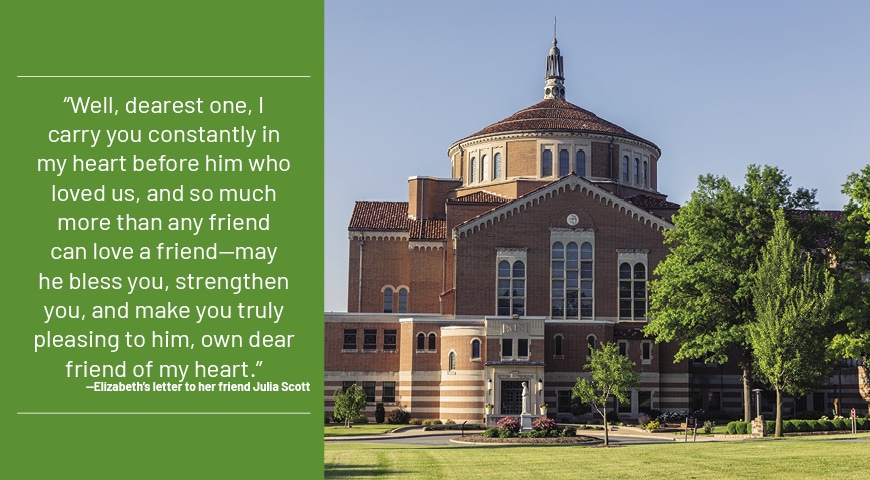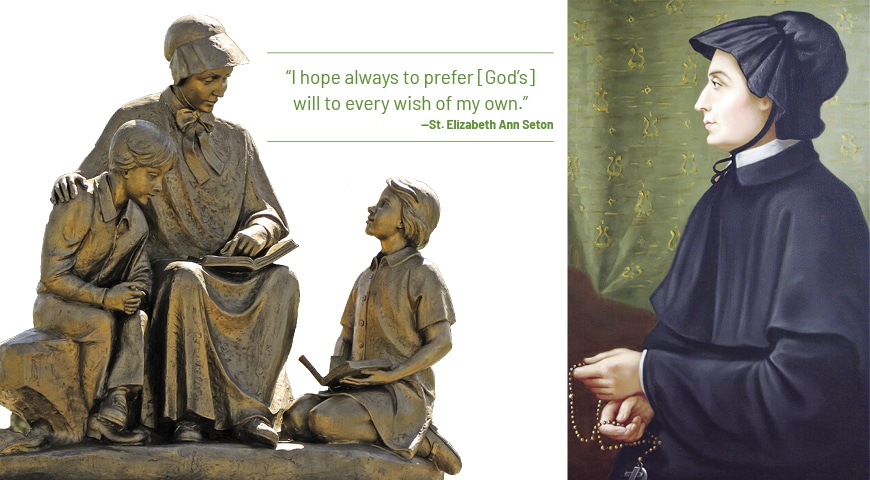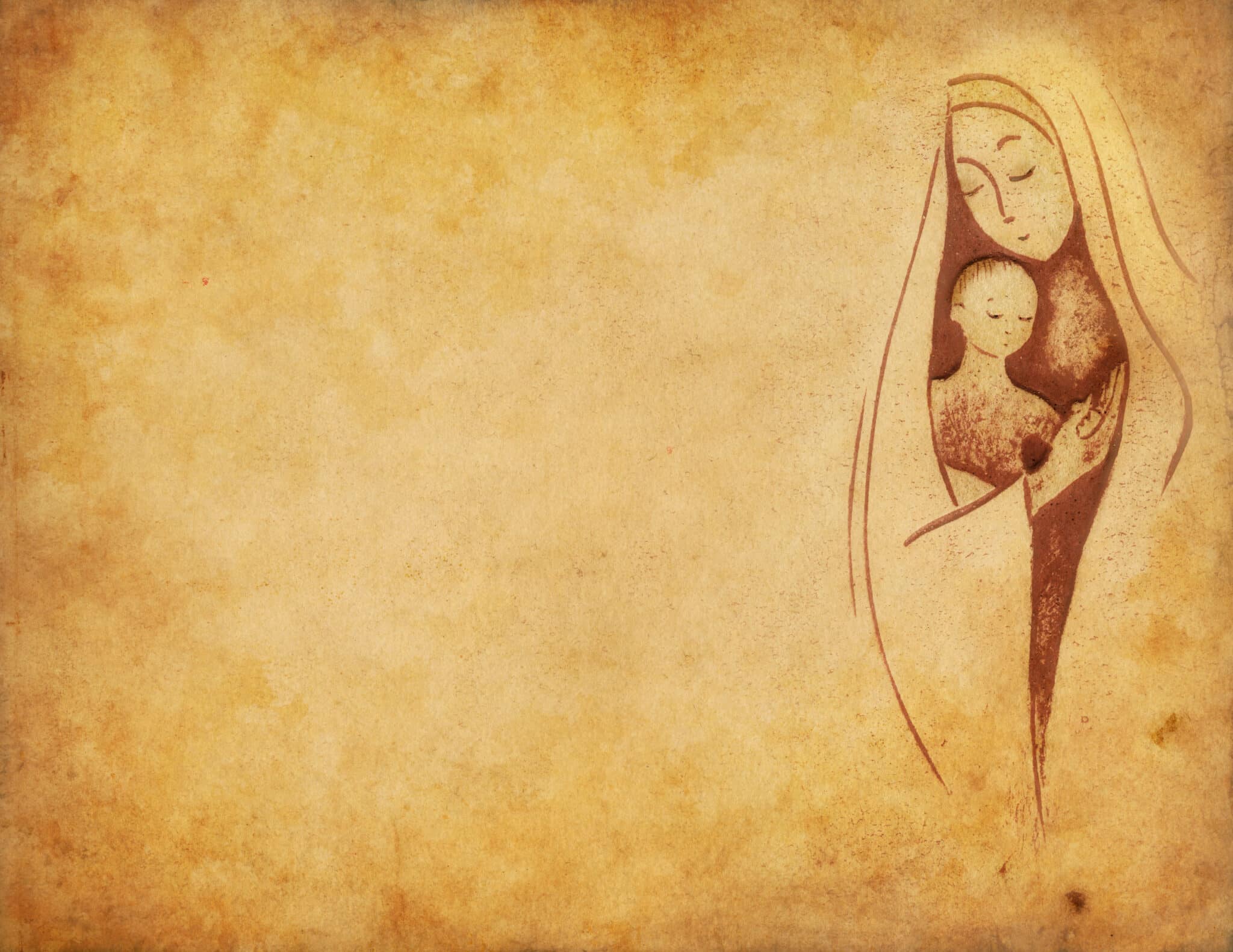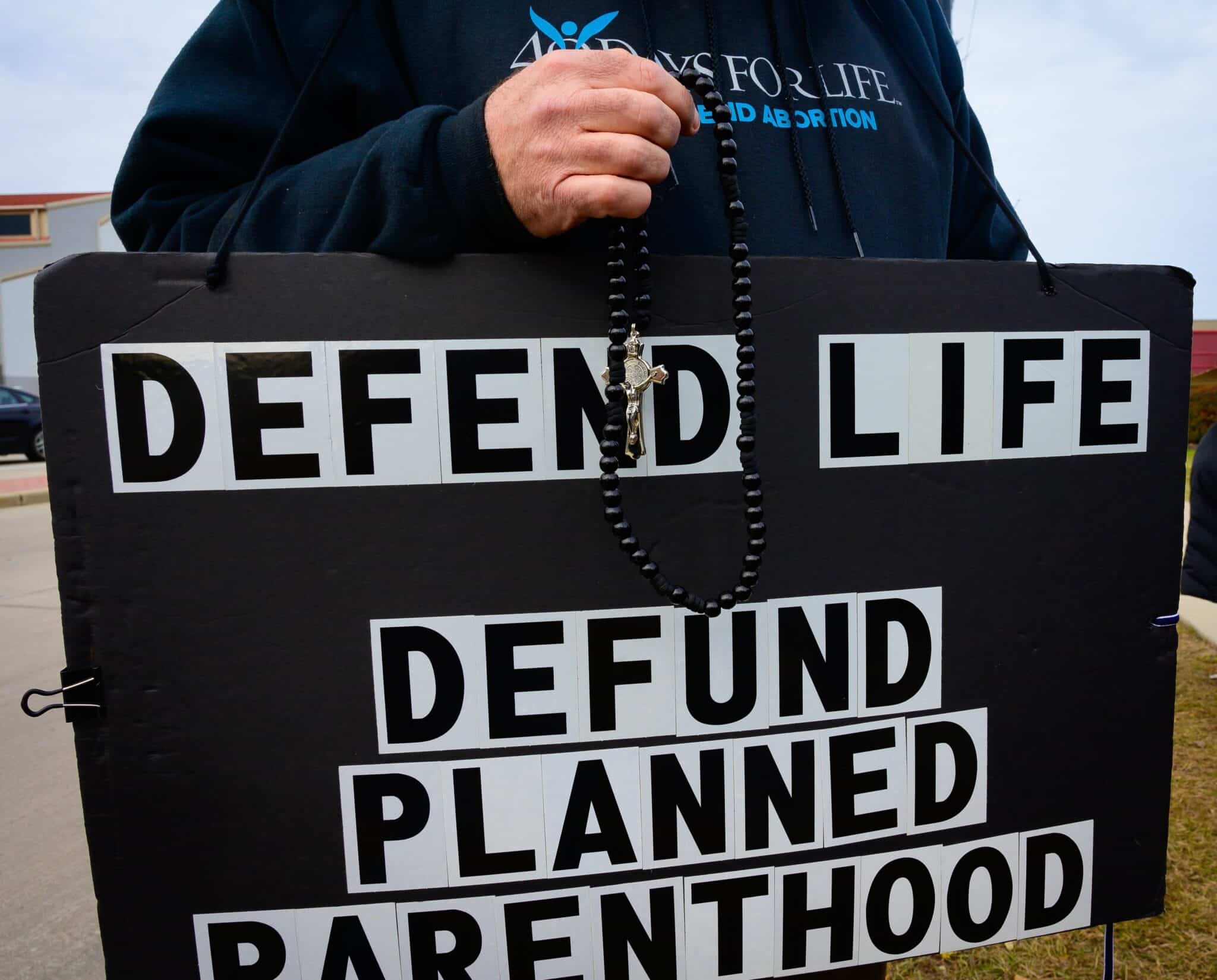Can a saint who died over 200 years ago have relevance for today? This author says yes as she imagines writing a heartfelt letter to Elizabeth Ann Seton, the first American-born saint.
Dear Elizabeth Ann Seton,
This letter comes as a long-overdue message of gratitude. I feel as if I know you personally—through your writing—even though you died in 1821, two centuries ago. So I wonder if we can skip the formalities. May I use your father’s nickname for you, Betty (Bayley), or your beloved husband’s term of endearment, Eliza? Your fondness for nicknames for your children and friends is so endearing. My mother attached a nickname to me at birth—Buffy—though I am proud to say I also am an Elizabeth.
Now to the point of my penning this letter: So many people owe you thanks for the amazing things you accomplished in your 46 years and for the legacy you left our nation and the world. I’m especially aware of the good works that continue in your name through the Sisters of Charity, which you founded.
My gratitude, however, is more personal: Thank you for affirming that the way I have chosen to live has value, because I am trying to be what you were—a profoundly human saint.
Since this is a letter, not a book, I will focus on a few values we share, ones that are essential to my life as a 21st-century Catholic woman.
* * *
Both of us love and enjoy the arts. I know from your letters that as a young woman you were able to take coaches to the theater; you wrote that, on a Friday night: “I went thro’ all the storm with my sister to the Theatre.” I hear you: No storm will keep me from a performance at Playhouse in the Park or Ensemble Theatre here in Cincinnati. You write about meeting a friend at a concert, and you played piano at friends’ homes when you were invited to tea. One of my favorite scenes from your life as a young wife was your accompanying your husband, Will, on the piano as he played his violin for your children. As a teenager, you loved to dance. Even though I know you lived simply once you were “Mother” to religious women, I find it thrilling to realize that when you died, they found among your scant possessions your petite dancing shoes. (I bet Will was a dancer too!) A saint with secular interests is no contradiction; in my case, the arts have deepened my empathy for others.
You were a voracious reader; you enjoyed the latest novels, and as a religious sister you read many works to guide your young community. You shared your love of books, and the books themselves, with your friends. Novels must have given you temporary respite from the challenges of raising your children. As a mother of three, I always made time to read when my girls were napping or in bed for the night. Now that they are adults with children of their own, I have the luxury of reading nightly from a favorite writer. Were you living today, you would love them for their stories and for their developed characters, who because they are human are not without their warts.
Once you left New York to found a school and religious order in the hills near Emmitsburg, Maryland, you continued to read, but the novels gave way to more spiritual reading. You composed instructions for your sisters with ideas from classic texts such as The Spiritual Exercises of St. Ignatius Loyola, the teachings of the Fathers of the Church and councils of the Church, and, most importantly, the Christian Scriptures. The French your father encouraged you to learn as a young lady came in handy when you had access to instructive writings in that language.
It will be abundantly clear that I love your writing when I tell you I own four volumes of your work. Widowed myself when my daughters were teens, I feel certain that once William died and you had five young children to provide for, you physically ached with grief. Some of your writings are beautifully heartbreaking, especially entries about the deaths of Will, his sister Rebecca (your “soul’s sister”), and two of your daughters, Anna Maria and Rebecca. Like you, I prayed and wrote my way through grief as a young mother: letters, reflective essays, and even a book, in which I allowed myself to be vulnerable, sharing publicly what grieving looks and feels like. As your letters and journals lifted me up, so I hope my writing has been a gift to readers I may never meet.
* * *
Like me, you also had an inner circle of close friends who were the lucky recipients of your frequent letters throughout your life. You cherished your friends Eliza Sadler and Julia Scott, as well as Antonio Filicchi, who was such a comfort to you at the time of Will’s death and beyond. You died too early to know of the poet Emily Dickinson, but I suspect you would love her quote: “My friends are my estate.”
I enjoy following your written interactions with Eliza and Julia over the years. You and your friends were so open in proclaiming your love for one another. In a 1796 letter to Eliza, you write: “Do you not think that after all of the anxiety I have lately known on your account, I kissed the letter and placed it in my bosom, which told me you were quietly living among all the tumults which surround you. . . . Think of me as one who often thinks of you and who hopes not withstanding all the changes and chances, to meet you soon with the welcome of true affection.”
Your letters kept you connected to your dear friends. Though you rarely had a chance to speak with them in person, your lives remained intertwined even as your paths diverged. Julia regularly sent $50 donations for you to use for your children or for expenses at the school and convent. In an 1812 letter to Julia that was typical of many, you write: “Your bountiful hand never closes, dear friend; the pleasure you must have in bestowing is very great I know, but I should have some hesitation in receiving . . . if the sickness of my dear ones had not obliged me to make many expenses.”
Yet you and Julia never resolved the tensions around your devotion to your Catholic religion, which she described as “folly, madness, bigotry, superstition, etc., etc., etc.” Still, you end your letter with a blessing: “Well, dearest one, I carry you constantly in my heart before him who loved us, and so much more than any friend can love a friend—may he bless you, strengthen you, and make you truly pleasing to him, own dear friend of my heart.”
How I need to read these lines often these days when my country—the country you loved when it was still in its infancy—is being racked by divisions that seem at times irreconcilable. But you, Elizabeth, held on to your friendship with Julia over the years, despite her negative judgment for what you held most dear, your Catholic faith. Thank you for reminding me that friendships can stay strong despite deep differences.
* * *
I am so grateful to you for reinforcing my love for my family. From your days as a newlywed through the end of Will’s life, it was evident that Will cherished you and each child who came along to grace your growing family. He was especially close to his father and loved his family of origin, so much so that after his father died, you relinquished your routine of living in quiet with your small family “to become at once the mother of six children and the head of so large a number.” You and Will brought his six younger half-brothers and sister into your home to live with the two of you and your two children, a sudden household of 10. It shows your love and generosity, especially since the time was near for the birth of your third child.

Even as you became “Mother Seton” to your community of women religious, you remained a devoted mother to your children. In Maryland, your two boys resided for a time at nearby Mount St. Mary’s College in Emmitsburg, and your three daughters lived with you at the school and convent in St. Joseph’s Valley. Your letters to Eliza and Julia make it clear that even as you doted on your children, you worried about their physical and spiritual health. When they were away from you, you were faithful in writing to them, each letter a mix of practical and spiritual encouragement:
To Anna Maria: “Be sure my dearest Ann, go to him your Father, your friend, your refuge, your All.”
To William: “Your Birth day!—You know your Mother’s heart. Be blessed a thousand thousand times—take a few little moments in the church to say in union with your Mother’s heart to place yourself again and again in the hands of God—do my dearest one.”
To Richard: “Our God will do all for you, but you must and shall be good. And your little Mother will fight all your battles till you are able to fight ours, dear Goliath of my heart.”
To Catherine: “Whose Birth day is this, my dear Saviour. It is my darling one’s, my child’s, my friend’s. . . . Every time the clock strikes I bless and pray for you.”
To Rebecca: “Be good is all Mother can say—Annina says it too.”
Your love for your children, especially as a single parent, is beautifully summed up in Dear Remembrances, a memoir you wrote about 10 years before your death. In it you reviewed your life from age 4 until the time of your writing: joys, regrets, painful memories. My favorite remembrance captures a sweet memory of your family after Will’s death: “Now my entrance with my darlings in our little dear humble dwelling—their tender doting love to their own Mother—my Anna, William, my Richard, my Kit and sweetest Bec, at the moment yet with what delight I look at the hours of love around our fire, or little table or at the piano, our stories every evening, lively tunes, and thousand endearments after the lessons, and work of the day when each one helped dear Mother.”
* * *
On the day of your canonization as the first saint born in the United States, I happily anticipated the well-deserved attention your remarkable life would receive. But the title saint is not without its drawbacks. Of course, one must have died to be declared a saint, but sometimes the saints’ stories become little more than predictable facts in a volume such as the one I read as a child, Butler’s Lives of the Saints. Some of these don’t do justice to you as a saint who, like Jesus, was not only deeply spiritual but also profoundly human. Every time I open the volumes of your letters and journals, I reconnect—spiritually and humanly—with you more deeply than in previous readings.
I will end this letter of gratitude with a final thank-you for all that makes you a role model for me. Thanks especially for often reminding me to find grace in the present moment, something I aspire to every day, as I imitate you in my goal of being both holy and profoundly human.
Ever yours,
EBB

Elizabeth Ann Seton (1774–1821)
Mother Seton is one of the keystones of the American Catholic Church. She founded the first American religious community for women, the Sisters of Charity. She opened the first American parish school and established the first American Catholic orphanage. All this she did in the span of 46 years while raising her five children.
Elizabeth Ann Bayley Seton is a true daughter of the American Revolution, born August 28, 1774, just two years before the Declaration of Independence. At 19, Elizabeth was the belle of New York and married a handsome, wealthy businessman, William Magee Seton. They had five children before his business failed and he died of tuberculosis. At 30, Elizabeth was widowed and penniless, with five small children to support. While in Italy with her dying husband, Elizabeth witnessed Catholicity in action through family friends. After returning to the United States, she became a Catholic in March 1805.
To support her children. she opened a school in Baltimore. From the beginning, her group followed the lines of a religious community, which was officially founded in 1809.
Mother Seton’s letters reveal the development of her spiritual life. She suffered great trials of sickness, misunderstanding, the death of her husband and two young daughters, and the heartache of a wayward son. She died January 4, 1821, and became the first American-born citizen to be canonized (in 1975). She is buried in Emmitsburg, Maryland.









3 thoughts on “‘Dear Elizabeth Ann Seton’ ”
Very moving and personal “open letter.” I knew little of Mother Seton. Would have been wonderful to know her!
Thank you for writing such A lovely sincere and intelligent letter. I learned so much from it.
Such a joy to read your letter – woman to woman, mother to mother! Your deep knowledge of Elizabeth Seton and genuine love for her is evident. May your words open doors to many, so they too may find in Elizabeth a real friend and companion.